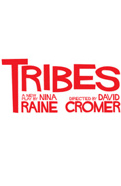Susan Pourfar on Eating Twizzlers During Tech, the Courage of Castmates & More Lessons Learned at Tribes
About the author:
Susan Pourfar is no stranger to the off-Broadway stage, starring in Last Sunday in June, In the Wake, The Singing Forest, When the Rain Stops Falling, Swimming in the Shadows and more. After crash courses in sign language, the piano, British dialects and deaf culture, Pourfar earned critical acclaim and a 2012 Obie Award for her heart-wrenching turn as Sylvia in Nina Raine’s Tribes at the Barrow Street Theatre. As Sylvia gradually loses her hearing, her world becomes smaller and smaller—meanwhile, her deaf boyfriend Billy (played by Russell Harvard) finds solace in the deaf community Sylvia finds stifling. In a touching essay for Broadway.com, Pourfar, who will end her six-month run on September 2, reflects on the important life lessons she has learned from the Tribes cast, creative team and more.
![]()
From the seven months I have spent in rehearsal and on stage doing Tribes, here are some acting and life lessons I have gleaned from the creative artists I have had the good fortune to work with. All the designers, though no longer around, remain with us in their way. So, here’s what I’ve gained:
From Jeff Perry (original company member): Ensemble building. Big heartedness. It never hurts to bring three flavors of gelato backstage—for cast and crew—before a Sunday night show. Sugar and cream can get anyone through a five-show weekend.
From Mare Winningham (company member): It is possible to give birth to five beautiful children in a cabin. No hospital and no drugs. If some dreams were put on hold, well then her gorgeous kids—beyond being ridiculously intelligent audience members—are living proof that dreams come true in different forms, at different times.
From Will Brill (company member): It is possible to eat dinner from a Halal truck an hour before curtain and go on to deliver a lived-through, gorgeously nuanced, deeply generous performance. It is also possible to leave the nest and come home again…and keep every bit of heart intact on the round trip.
From Russell Harvard (company member): Leaving what you know (Austin, Texas, surrounded by your deaf friends and family) and entering a new world (NYC, surrounded by talk-y actors) can simultaneously be the most frustrating and most self-affirming experience. Russell’s transition from slightly wary to disarmingly available is one of the fullest, most moving metamorphoses I’ve ever witnessed, onstage or off. Plus the ASL signs for: gay, straight, lesbian, bisexual and questioning. They weren’t in my ASL book. Weirdly.
From Gayle Rankin (company member): Emotional availability. Laughing and crying are the same muscle. Courage. Here’s a young woman who left her home in Scotland to study at Juilliard and has fought with heart and soul to stay on and do what she most loves. Her courage puts in perspective what we Yanks take for granted: working in one’s home country.
From Daniel Kluger (sound designer): The “Clair de Lune” on piano. But first this: If you are teaching someone piano, the statement “let’s talk about fingering” is perfectly fair game.
From Candace Broeker (ASL teacher, interpreter): Sign language. But more than that: the body language of a woman who is the child of deaf parents (CODA) and grew up hearing in a deaf family. I ripped off a ton of her physicality.
From Scott Pask (set designer): If you put an obstacle in an actor’s way—a bench in the entrance to a living room—the actor will step over it and everyone will look more brilliant for it.
From Tristan Raines (costumes): In a house of stay-at-home intellectuals, footwear is optional.
From Keith Parham (lighting): A lamp can be a moon. A moon can be a lamp.
From Nina Raine (playwright): Crafting. The call back. A posh British accent that I attempt to recreate onstage. Never underestimate the audience’s willingness to work hard.
From David Cromer (director): If I am asking, “Is it this or that?” I am thinking too narrowly. It is this and that. In life and in art. A burning conviction, deep and almost vehement, that we humans are contradictory creatures in life, so why not on stage? Oh, and it is possible to live through 10 days of tech on a diet of Twizzlers, occasional sushi and 5-Hour Energy drinks. But is it necessary? Will someone give that MacArthur winner a vegetable?!
From Seth Sikes (assistant director): Humor. Patience. Gorgeous cheekbones are God-given and that’s all there is to it.
From Richard Hodge/Rosy Garner (stage management): The show must go on (preferably at 7:30).
From Nick Westrate/Jeff Still/Leeroy Rogers (replacement company members): To replace is not to fill another’s shoes; it is to cobble one’s own.
From Scott Morfee (producer): It’s a family. First and foremost. It’s a business plan. After that.
From Jean Doumanian, Patrick Daly, Tom Wirtshafter, Judi Krupp (and all the producers): Be bold. Take risks. THE PLAY IS THE THING.
From O&M (press): It’s OK to use this format for a personal essay.
